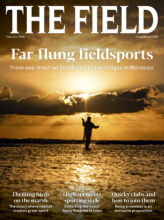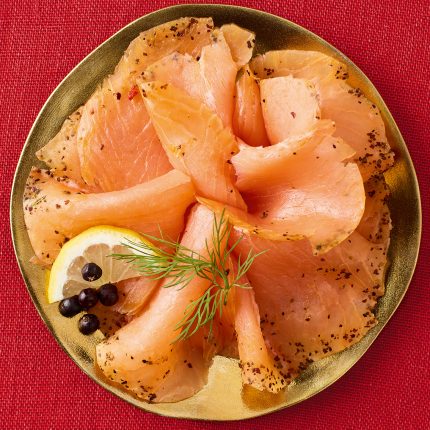Salmon & Trout Conservation have launched a campaign that advocates a boycott of all farmed salmon. Here, Andrew Graham-Stewart sets out their case
Eating salmon, particularly smoked salmon, was, historically, a treat for special occasions. Back then it would have been wild salmon – before the great decline in populations, prompting the phasing out of the netting industry and the necessity for conservation measures. Wild Atlantic salmon no longer feature in fishmongers or on restaurant menus.
From the 1990s, the demise of wild salmon coincided with the inexorable growth and availability of a vastly inferior product: the ubiquitous farmed salmon. The irony is that not only has it replaced wild salmon on the slab but the industry has decimated wild salmon (and sea-trout) runs wherever the salmon farming industry has been permitted across the northern hemisphere. It is no coincidence that most the remaining abundant wild salmon runs are in Alaska, with no salmon farms, and Russia, with hardly any.
Aside from the devastating impact on wild fish, farmed salmon is the product of a fundamentally unsustainable industry. It sources much of its feed (fishmeal and fish oil) from developing countries in South America and West Africa (depriving local communities of much-needed protein), then transports it for thousands of miles. How can that be deemed sustainable?
It takes tens of thousands of wild wrasse from coastal reefs and confines them in salmon cages as ‘cleaner fish’ (killing them at the end of the salmon production cycle). How can that be deemed sustainable or, indeed, morally defensible?
How can a business model that allows for more than 20% fish mortality before harvest from disease and parasites be deemed sustainable?
In 2020, this mortality amounted to 27,000 tonnes. At 5kg per fish this equates to 5.4 million farmed salmon; this is a gross underestimate, as young fish are much lighter. Any terrestrial farm with similar mortality levels would be closed down immediately.
The Advertising Standards Authority has required farmed salmon producers to stop using ‘sustainable’ to describe their production methods, while in the US Mowi – one of the world’s biggest salmon farmers – has been ordered to pay damages for falsely claiming its salmon to be ‘sustainable’ and ‘eco-friendly’.
The Scottish Government consistently turns a blind eye to the industry’s environmental record and seems hell-bent on enabling it to expand. For years we have campaigned unsuccessfully for robust regulation. Now, we have changed tack. We are now calling for an end to all open-net salmon farming.
The grim reality of industrial salmon farming is so often hidden from view. Perhaps more of us would shun the product if we understood its origins. With this in mind, we launched a campaign in November asking consumers to ‘Say no to farmed salmon this Christmas’. Of course, giving up salmon at Christmas is just the starting point, we must say no to open-net farmed salmon full stop and expose the unsustainability of the industry. This supports a growing need from the consumer for better access to information about where their food comes from.
These are our answers to some common comments:
“We only buy salmon that is ‘responsibly sourced’.” This is just meaningless industry greenwash.
“We only buy salmon from certified farms.” Farms labelled as ‘certified’ have little credibility and perform no better environmentally than other farms. We will be addressing the questionable nature of these schemes over the course of the year.
“We only buy organic salmon.” ‘Organic’ salmon is a marketing ploy to justify premium prices. The only real difference is that it is stocked at a lower density. Fish faeces still pollute and destroy the integrity of the seabed. ‘Organic’ salmon farmers use all the same lethal chemicals. The problems with sea lice and escapes are just as prevalent – so the impacts on wild salmon and sea-trout are identical.
“We have switched from salmon to trout.” Farmed trout would not be a sustainable alternative at the same volumes. Much of the trout sold in the UK (they are rainbow trout, a naturally sea-going Pacific species) are raised in open-net sea cages and all the issues that relate to farmed salmon – including sea lice and escapes – apply.
In some parts of the world closed containment production is used to provide a biological and physical barrier between farmed fish and the wider environment. In the UK, there is no land-based closed containment so if fish is farmed then there is no good or better choice.
Salmon & Trout Conservation believes that farmed salmon and trout, as sold in the UK, should be shunned by consumers. Our work helps to inform the public on this subject. In this vein, we recently published a literature review that outlines the impact of open-net salmon farming on wild fish and the environment (available at salmon-trout.org); since November, we have published weekly data to show sea lice levels in Scottish open-net salmon farms. Our next steps will involve calling out restaurants and retailers as well as the so-called accreditation schemes.
We all have a role to play in educating friends and family about the impacts of open-net salmon farming. Our aspiration is to provide the public with the tools to do this. This year, we encourage you to ask the question: what is really on my plate?
Andrew Graham-Stewart is director of Salmon & Trout Conservation Scotland





